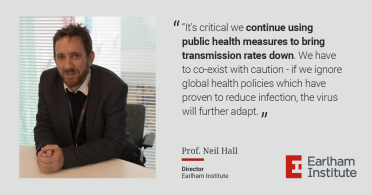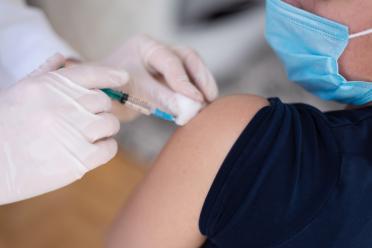An editorial published in the journal Virulence argues against the current approach towards lifting public health measures designed to curb the spread of COVID-19, warning this is playing into the hands of the virus at a time when transmission rates are so high.
The piece describes how we are in a ‘coevolutionary arms race’ with the virus and rising cases provide opportunities for it to evolve into even more transmissible variants. Of particular concern is the decision not to roll-out vaccines to the under-18s, creating a pool of vulnerable people in which the virus can continue to spread and mutate.
The researchers fear that any new variants could be more virulent, more vaccine resistant, and also more dangerous for children and clinically vulnerable groups.
Professor Neil Hall, Director of the Earlham Institute and co-author of the editorial, said: “As long as there are large numbers of unvaccinated people around the world transmitting the virus, we're all at risk. High numbers of COVID-19 cases increase the likelihood the virus will evolve to become more virulent, more transmissible, or capable of evading vaccines.
“It's critical we continue using public health measures to bring transmission rates down. We have to co-exist with caution - if we ignore global health policies which have proven to reduce infection, the virus will further adapt.
“When we weigh up the benefits and risks in vaccinating young people, we have to consider the impact on wider society too. The current approach to protecting young people seems to be letting them reach herd immunity through infection. Every day that approach continues, we give the virus the upper hand and prolong this pandemic - increasing the burden on healthcare systems and economies.”
Lead author and editor in chief of Virulence, Prof Kevin Tyler from UEA’s Norwich Medical School, said: “Over the past 17 months, economies, education and mental well-being have suffered tremendously due to the restrictions imposed in an attempt to stem the spread of the pandemic.
“Although vaccines have weakened the link between infection and mortality, they should not be used as an argument to justify a broad change in policy for countries experiencing an exponential increase in infection numbers. This is because most of the world’s population are still unvaccinated and, even in countries with efficient vaccination programmes, a significant proportion of society - particularly children - remain unprotected.
“Relaxing restrictions boosts transmission and allows the virus population to expand, which enhances its adaptive evolutionary potential and increases the risk of vaccine-resistant strains emerging by a process known as antigenic drift. Limiting the spread of Covid-19 as much as possible restricts the number of future deaths by restricting the rate with which new variants arise.
“Successive SARS-CoV-2 variants, such as the Alpha and Delta variants, have displaced one another since the outbreak. Slowing down the rate of new variant emergence requires us to act fast and decisively, reducing the number of infected people including children with vaccines and in combination with other public health policies.
“In most cases, children are not vaccinated against COVID-19 because the risk of them becoming seriously ill is very low. But new strains may evolve with higher transmissibility in children, and vaccinating children may become necessary to control the emergence of new variants.
“A policy of relaxing restrictions while children are not vaccinated risks inadvertently selecting for virulent variants that are better able to infect children and are also more problematic in vulnerable groups. Children may be particularly at risk because they are the only group that has remained unvaccinated. But there is no guarantee that the virus won't evolve the ability to infect children too, and the data shows that new variants are relatively more often found in younger age groups.
"Only when a large proportion of the world’s population is vaccinated, or has acquired immunity from infection, can we relax other social measures.
Co-lead author and evolutionary biologist Prof Cock Van Oosterhout, from UEA’s School of Environmental Sciences, said: “We have an arms race on our hands.On the human side, the arms race is fought with vaccines, new technology such as the NHS COVID-19 App, and our behavioural change, but the virus fights back by adapting and evolving.
“It is unlikely we will get ahead in this arms race unless we can significantly reduce the population size of the virus. But, given that the infection rate is about the same now as it was during the first wave, we are pretty much ‘at evens’ with this virus. And as with many other coevolutionary arms races, there are no winners.
“This is what evolutionary biologists mean when we say that coevolution is a ‘zero-sum game’. But what you cannot do is suddenly drop your guard in the middle of an arms race. That gives your opponent - the virus - a real advantage. So we must continue doing the things we have been doing for the past 18 months, particularly in countries where the number of infected people is increasing.
“Entrusting public health measures to personal responsibility is a laissez-faire approach that many governments are now taking towards COVID-19 management. During exponential transmission of virus, we need an ongoing, mandatory public health policy that includes social distancing and the compulsory wearing of facemasks in crowded indoor spaces such as shops and on public transport.
“Our current vaccination programmes alone will not end the pandemic and scientific evidence suggests that we can only safely start to relax social restrictions when the R number is below one,” he added.
The editorial, ‘COVID-19 adaptive evolution during the pandemic – Implications of new SARS-CoV-2 variants on public health policies’, appeared in the journal Virulence on July 27, 2021.
The article was led by researchers at UEA in collaboration with Norwich Research Park colleagues at the Earlham Institute, as well as the University of Pittsburgh, the University of California Davis, the University of Minnesota Twin Cities, and King Abdul Aziz University, Jeddah, Saudi Arabia.


